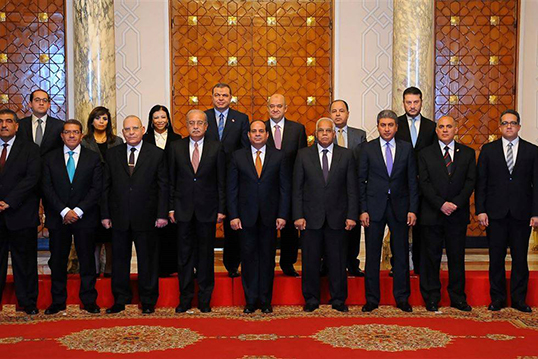
Egypt reshuffles its cabinet amid ongoing power outages and economic strains
On Wednesday, Egyptian President Abdel Fattah al-Sisi swore in a drastically reorganized cabinet that includes new ministries of finance and international affairs. The government is confronted with a number of difficulties, including as the border conflict with Gaza, economic difficulties, and frequent power outages.
Prime Minister Mostafa Madbouly was reappointed by Sisi after the resignation of the previous cabinet was announced a month ago. Sisi stated that the main goals of his new government will be to increase investment and reduce inflation, which reached record highs last year.
Ahmed Kouchouk, a well-known individual who served as the World Bank’s chief economist before taking on the role of deputy finance minister in 2016 and leading negotiator for the International Monetary Fund, is the new minister of finance.
Following his oath of office, Kouchouk declared that Egypt was dedicated to pursuing structural reform to enable the expansion of the private sector, as well as budgetary restraint and debt reduction.
Reappointed with planning and economic development added to her portfolio, Rania al-Mashat was previously the minister of international cooperation and was responsible for securing funding for development projects. Hassan El Khatib, a financial background and former employee of the European Bank for Reconstruction and Development, took over as the newly resurrected minister of investments.
Following the disclosure of the appointments, Egypt’s sovereign dollar bonds saw a surge early on Wednesday, with the longer-dated maturities seeing the largest gains.
FUEL SHORTAGES
Egypt’s long-standing foreign exchange shortfall has been lessened by a recent infusion of capital and money from the UAE, the IMF, and the EU, among others; nevertheless, since then, power outages and gas shortages have made life difficult for both businesses and residents.
After being nominated petroleum minister, Karim Badawi, a manager at the oil services company SLB, stated that supplying fuel to power plants will be a top priority. Mohamed Shaker was succeeded at the ministry of energy by Mahmoud Esmat, a former minister of public enterprises.
At the supply ministry, which oversees wheat purchases, Sherif Farouk took over from his predecessor as chairman of Egypt Post, where he had overseen reforms to pension payments systems.
In addition to being one of the largest importers of wheat worldwide, Farouk will oversee a food assistance program that provides food for over 60 million people and is up for reform.
Over the previous two years, as Egypt struggled to control a dollar shortage and soaring inflation, there have been rumors that Madbouly himself may be replaced.
To put Egypt’s economy on a more stable foundation, analysts and businesses argue that significant changes are required, including the state and military making room for the private sector.
Mahmoud Mohieldin, a former Egyptian minister of investment, told the American Chamber of Commerce in Cairo on Monday that in addition to enabling much increased exports and tax revenue, institutions also need to invest in human resources.
“We need to have a plan from now, which is a new growth model, a new development model,” he stated.
CHANGES IN THE MILITARY
In Egypt, ministers have very little decision-making power; the president, the armed forces, and the security agencies have actual power.
On the eleventh anniversary of the day that Sisi, the army chief at the time, overthrew Mohamed Mursi, the leader of the Muslim Brotherhood and Egypt’s first democratically elected president, the new cabinet was sworn in. Since then, Sisi has oversaw an extensive crackdown on political dissent.
Senior military roles saw a number of changes: Lieutenant General Ahmed Fathy Khalifa took over as chief of staff from Lieutenant General Osama Askar, while General Abdel Majeed Saqr, a former governor of Suez, was named as defense minister.
Badr Abdelatty, Egypt’s ambassador to the European Union, replaced Sameh Shoukry, a seasoned diplomat who led Egypt’s diplomatic attempts to mitigate the effects of the Gaza War, in the foreign ministry.
All Categories
Tags
+13162306000
zoneyetu@yahoo.com



